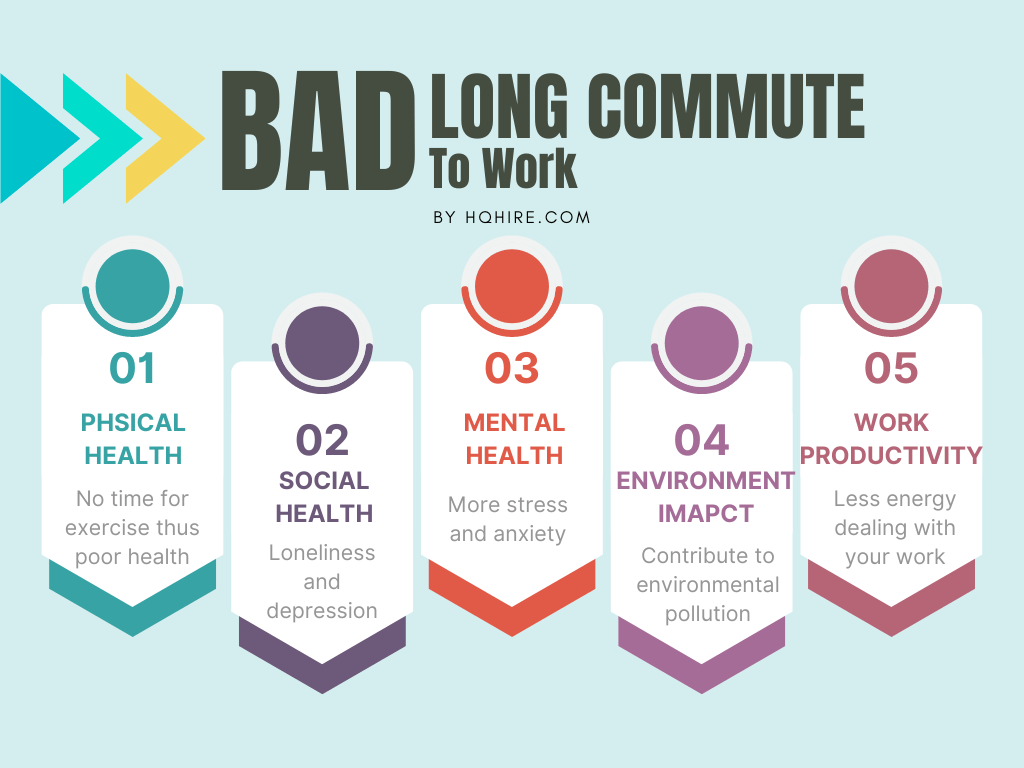Unless you are working from home, you will probably need to commute to work.
- The average one-way commute time to work in the United States has increased to 27.6 minutes now, up from 26.1 minutes in 2016 and 25.1 minutes 10 years ago.
- 1 in 4 workers left their job stating commuting is their main reason to quit.
- 25% of workers do not commute to work.
Commuting to work is common for most employees, and traveling long distances to your job each day is not uncommon.
Millions of workers spend hours each day commuting to work.
“But how long of a commute is considered to be reasonable?”
What Is A Reasonable Commute To Work?
A reasonable commute to work is determined by two factors; time and distance. The commute to work should be less than 50 miles and within 30 minutes, where the commuting area from your home to the workplace should be within the area of intended employment.
Nonetheless, a reasonable commute to work sometimes varies between individuals and circumstances.
How long is a reasonable commute time to work?
The commute time to work should be at least 5 minutes long, and ideally, the one-way commute time should be more than 16 minutes.
According to our recent survey, the commute of 20 to 30 minutes to work is generally considered to be a reasonable commute time.
How long is a reasonable distance to commute to work?
A reasonable commute distance to work should be less than 50 miles and the commute will preferably be less than 5 straight lines.
But a good commuting distance to work is highly determined by a variety of circumstances such as the geographical landscape or traveling conditions from your home to your workplace.
What Is An Average Commute To Work?
An average commute to work is 27.6 minutes. The commute to work can be defined as the distance someone travels to get from their home to their place of employment. 1 in 3 workers in the United States spends 15 minutes to 29 minutes commuting to work each way.
The variation is huge as there are a number of factors that can affect this number. Commuting times vary based on where someone lives, the type of transportation they use, and the time of day they travel.

How long is the average commute time to work
An average American spends less than 1-hour round-trip commuting for work.
On average, 94% of all workers in the U.S. spend 27.6 minutes to commute each way to work and travel for an average of 18.8 miles to work each way.
With a 5 days work week, the time spent on commuting for average commuters is calculated.
- Average commuters spend 4.6 hours per week and 239.2 hours per year commuting.
- Average commuters spend more than 1 week, which is 9.97 days per year traveling to and back from their workplace.
How long is the average commute distance to work?
On average, 9 in 10 American workers commute 18.8 miles to work each way.
With a 5 days work week, the distance traveled for commuting to work for average commuters is calculated.
- Average commuters travel 188 miles per week and 9,776 miles per year commuting to work.
- Average commuters travel a distance equal to 3,309 football fields per week and travel a distance equal to two-fifth of the Earth per year commuting to work.
How Long Of A Commute Is Too Long?
Commutes that are longer than 45 minutes are considered long. With a 5 days work week, you will spend 7.5 hours per week and 390 hours per year commuting. Which is equivalent to 16.25 days of traveling to and back from your workplace.
HQHIRE did an analysis of the study performed by the Census Bureau on 75.746 million workers in the United States, to understand what percentage of our workers perform a commute that is longer than reasonable.
- Extreme commuting account for 2.26% of all workers who travel 90 minutes or more commuting to work each way.
- Long-distance commuting accounts for 2.96% of all workers who travel more than 50 miles or more commuting to work each way.
- Mega commuting accounts for 0.77% of all workers who spend more than 90 minutes and travel for more than 50 miles to work.
Studies have shown, that there is a rise of “super” commuters from 1990 to date:
1 in 36 workers spent more than 90 minutes commuting each way to work.
With a 5 days work week, the time spent on commuting for extreme commuters is calculated.
- Extreme commuters spend 15 hours per week and 780 hours per year commuting.
- Extreme commuters spend more than 1 month, which is 32.5 days per year traveling to and back from their workplace.
The longer the commute, the lesser time you’ll have for your family, friends, social life, exercise, and self-care.
| Workers Commuting to Work | Mean Time (mins) | Mean Distance (Miles) | Commuters | Percentage of Commuters |
|---|---|---|---|---|
| Average | 27.6 | 18.8 | 71,203,000 | 94.00% |
| Extreme | 117.6 | 70.9 | 1,714,000 | 2.26% |
| Long-Distance | 61.3 | 247.3 | 2,242,000 | 2.96% |
| Mega | 119 | 166.4 | 587,000 | 0.77% |
Why long commute is bad?
Employees who require to have a long commute for a prolonged period of time will negatively impact their physical and mental health, environment, and work productivity.
- Physical Health. You do not have time to exercise as you’ve spent most of your time traveling, thus poorer cardiovascular health.
- Social Health. You reduce your time spent socializing, which can lead to loneliness and depression.
- Mental Health. You feel more stress due to the unpredictability of traffic events while you are rushing to work.
- Environmental Impact. You travel longer, thus contributing more to environmental pollution.
- Work Productivity Impact. You spend most of your time stressing about your commute, which leaves you with less energy dealing with your work, thus reducing your productivity at work.

Average Commute Time By Different States in The U.S.
The average commute time for each of the states in the United States is compiled and calculated to give you an understanding of where you stand on your commute to work each day.
The state with the longest commute time to work is found to be New York, with an average of 33.3 minutes of one-way commute to work.
With a 5 days work week, the time spent by an average New Yorker on commuting is calculated.
- Average commuters spend 5.6 hours per week and 288.6 hours per year commuting.
- Average commuters spend almost 2 weeks traveling, which is 12 days per year traveling to and back from their workplace.
| State | Travel Time (Minutes) |
|---|---|
| New York | 33.3 |
| Maryland | 32.9 |
| New Jersey | 31.7 |
| District of Columbia | 30.3 |
| Massachusetts | 29.7 |
| California | 29.3 |
| Illinois | 29.0 |
| Georgia | 28.4 |
| Virginia | 28.4 |
| Washington | 27.6 |
The state with the shortest commute time to work is found to be South Dakota, with an average of just 17.0 minutes for a one-way commute to work.
With a 5 days work week, the time spent by an average worker living in South Dakota on commuting is calculated.
- Average commuters spend 2.8 hours per week and 147.3 hours per year commuting.
- Average commuters spend less than a week traveling, which is just 6.1 days per year traveling to and back from their workplace.
| State | Travel Time (Minutes) |
|---|---|
| South Dakota | 17.0 |
| North Dakota | 17.1 |
| Wyoming | 17.8 |
| Montana | 18.0 |
| Nebraska | 18.6 |
| Alaska | 18.8 |
| Iowa | 19.1 |
| Kansas | 19.3 |
| Idaho | 20.1 |
| Arkansas | 21.7 |
The State you are living in the U.S. can determine how much time you spend traveling to and back from work.
- The State with the shortest average commute to work is “South Dakota”, with a one-way commute time of only 17.0 minutes, and 6.1 days per year traveling to and back from work.
- The State with the longest average commute to work is “New York”, with a one-way commute time of 33.3 minutes, and 12 days per year traveling to and back from work.
Depending on which state you live in, you can spend just half the time traveling to work, and more time with your family.

How does the urbanization rate affect the commute time of the high and low-income groups?
Increased urbanization rate of the Metropolitan areas can lead to an increase in the average commute time of the higher-income group but lowers the commute time for the lower-income group.
- High Income Group. Urbanization leads to more cars and transport traveling on the road which leads to slower traffic and thus increases the commute time for the higher-income group.
- Low Income Group. Urbanization allows workers of lower-income groups to be accessible to public transport for commuting to work, thus reducing the commute time for the lower-income groups.
How is commute time affected in a densely populated area?
States or cities with a population higher than the rest will require the workers to take a longer commute to work.
Living in an densely populated area can lead to an increase in commute time as well as non-motorised transport use.
A study on the average travel time to work by Metropolitan Area population size shows, that areas with more than 5 million people living will need an average of 33.1 minutes to travel to work, compared to areas with a population of less than 300,000 where it will only need 22.6 minutes to travel.
The difference in the amount of time you travel to work is huge, depending on where you work, you can save up to 7.5 minutes on traveling to work each way.
And if you are living in South Dakota, with an average commute to work of 17.0 minutes, you can potentially save 16.1 minutes each day.
| Metropolitan area (Population) | Average travel time (Minutes) |
|---|---|
| 5 million or more | 33.1 |
| 3 million to 4.9 million | 30.3 |
| 1 million to 2.9 million | 26.5 |
| 500,000 to 999,999 | 25.2 |
| 300,000 to 499,999 | 23.9 |
| Less than 300,000 | 22.6 |
How to make your time commuting worthwhile?
For most workers, commuting to work is unavoidable, unless you are working from home, or doing your work remotely.
Sitting in traffic, or stuck on the train can be frustrating, but you can utilize ways to maximize your time spend on your traveling.
Here are some suggestions:
- Take an online course
- Learn a new language on the go.
- Listen to a podcast
- Read a book
These activities allow you to maximize your time spend during your travel into an opportunity for you to learn a new skill or be inspired by some new information.
Learning something new on the go has become a popular choice for many successful employees. And getting to learn professional in-demanded skills from some of the best online learning platforms gives you an edge in getting promoted at work, making a change in your career, or getting hired for a better job
| Information Technology Courses | High Demand Skills and Certifications |
|---|---|
| Web Development | Graphic Design & Illustration |
| Mobile Development | Business Analytics & Intelligence |
| Game Development | Digital Marketing |
| IT Certification | Entrepreneurship |
Best way to reduce the commute to work
If you want to reduce your time to commute to work, the best way is to get a job near your home, or simply get a remote working job that doesn’t even require you to travel to work.
Remote working can have many benefits, ranging from financial benefits, and better mental health to higher work productivity. The option to allow employees to work from home has become very popular and many companies have introduced hybrid or remote work arrangements.
Check out our list of 300+ careers and occupations and find one that may suit you.
FlexJobs is a great place to find jobs that offer remote working opportunities. Otherwise, you can opt to become a freelancer and use a platform such as Fiverr to find work that allows you to work from home.
Up Next… Guide to quitting your job and getting a better one!
Read Also:
- Number of PMP Certified Holders By Country (211 Countries Worldwide Statistics)
- 10 Best Remote Jobs for College Students That Pays Well (with Tips)
- 10 Best Remote Jobs with No Experience Required (+Pays Well)
- 22 Top Industry Offering Remote Work Now (Future of Remote Jobs)
- 21 Best Remote Jobs to Work From Anywhere (High Paying)
Join over 11,000+ achievers who are committed to achieving their career goals!







